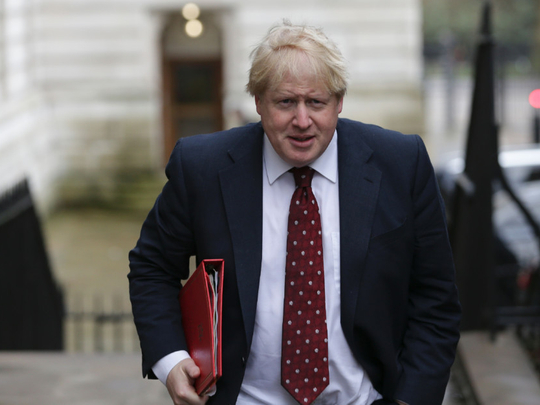
Ken Clarke has been in superb form since becoming the only Conservative MP with the bottle to vote against the Brexit bill, despite so many more sharing his belief that it is counter to national interests. The former chancellor was scathing about suggestions that countries will queue up to give Britain beneficial trade deals. Although never really a party moderniser, he also made pertinent points about the retoxification of the Tories, arguing that the country has in effect fallen under the control of a group of former fringe rebels.
In one telling passage of his speech to parliament last week — slating the Alice in Wonderland vision of Brexit — he said that Enoch Powell would “probably find it amazing that his party had become Eurosceptic and rather mildly anti-immigrant, in a very strange way, in 2016. Well, I am afraid that, on that issue, I have not followed it, and I do not intend to do so.” Quite right too. Nor do I intend to jump on this nativist bandwagon. Yet, among the tragedies of recent events has been the fact that this fear-filled mood of division and intolerance was aided by people I once stood alongside in attempting to modernise the Conservatives.
I do not blame Prime Minister Theresa May, although she first branded Tories “the nasty party” and now drives Britain into the wall of hardline Brexit. As prime minister, she has no option but to respect the referendum result, although I quibble with her interpretation that immigration controls are more important than anything else. But as divided countries turn to protectionism founded on hostility to foreigners, how sad that the flames of populism engulfing the west have been fanned by British people who proclaim themselves as globalists.
These are the so-called liberal Leavers, who provided the veneer of respectability for a Brexit campaign founded on misanthropy. Nigel Farage, former leader of the United Kingdom Independence Party (Ukip), and his friends were always the sort of small-minded folk who scapegoated foreigners for wider political failures: Remember when the then Ukip leader even blamed migrants for his being trapped in a traffic jam? But it is unlikely that Farage would have pulled off that incredible referendum result without having a few prominent Tories on the party’s moderate wing in the vanguard of their pessimistic army.
I thought about joining them — but only for a moment. I am no fan of Brussels, having seen first hand the damage caused by the euro and flawed refugee policies, and I desperately want Britain to be more openly engaged in the world. It did not take long to realise these ideals were unlikely to be achieved in harness with the most extreme elements in politics and in alliance with parties fuelled by hatred — especially in the current climate. Or to work out that disentangling from the world’s biggest economy would be hugely disruptive and probably hinder, not help, the cause of free trade.
So I found it depressing to see the likes of Steve Hilton and Michael Gove promote Brexit in tandem with Farage after all their efforts to make their party more appealing to women, young people and ethnic minorities. As mayor of London, Boris Johnson was leader of a city built on tolerance, but then led the leave campaign. Scores of backbenchers shared their views, then jumped into bed with divisive nationalists. Even Daniel Hannan, perhaps the most persistent Brexit campaigner, espouses a decently liberal global outlook.
These people hold a Big World vision of post-Brexit Britain. Hannan claimed the key issue in last year’s vote was democracy, not migration, and hours after the result even said he hoped free movement would not be impeded. Andrew Lilico, a leave economist used to counter other experts, insisted they never wanted “illiberal and anti-foreigner” policies when pushing to take back control. Yet, with weary inevitability the referendum was seized on by the new prime minister, devoid of meaningful opposition, to pursue her relentless immigration clampdown.
Now look at events abroad. In the United States, a president lashes out at refugees and endorses Russian President Vladimir Putin’s world view. US President Donald Trump used Brexit as his template for an anti-establishment insurgency founded on falsehoods and smears against foreigners. He called himself Mr Brexit, reportedly wants to see the European Union smashed to smithereens, and is admired by white supremacists. Meanwhile, in France and the Netherlands, we see far-right candidates ride alarmingly high in polls as elections loom, praising Brexit while preaching similar anti-globalisation and anti-Muslim sermons.
How proud those liberal Leavers must be as they survey this new world order, having done so much to foster the nationalist revolts. Still these people pose as optimists and rightly promulgate globalisation; but they must bear some responsibility for hitching themselves to forces of fear, then exploiting the concerns of communities buffeted by global forces and suffering from long-term government failures. These Brexiters played with fire by pandering to populism. And now the world is burning.
Instead of bridges being built, walls are going up around the West. Perhaps the liberal Leavers will recant and apologise, but more likely they will find excuses and blame others rather than search their own souls. It pains me to say this, since some are my friends, but the truth is that if they really believed breaking from Brussels would lead to a more open nation and outward-looking world, they should hang their heads in shame for stunning naivety.
— Guardian News and Media Ltd
Ian Birrell is a former deputy editor of the Independent. He had worked as a speechwriter for former British prime minister David Cameron during the 2010 election campaign.










